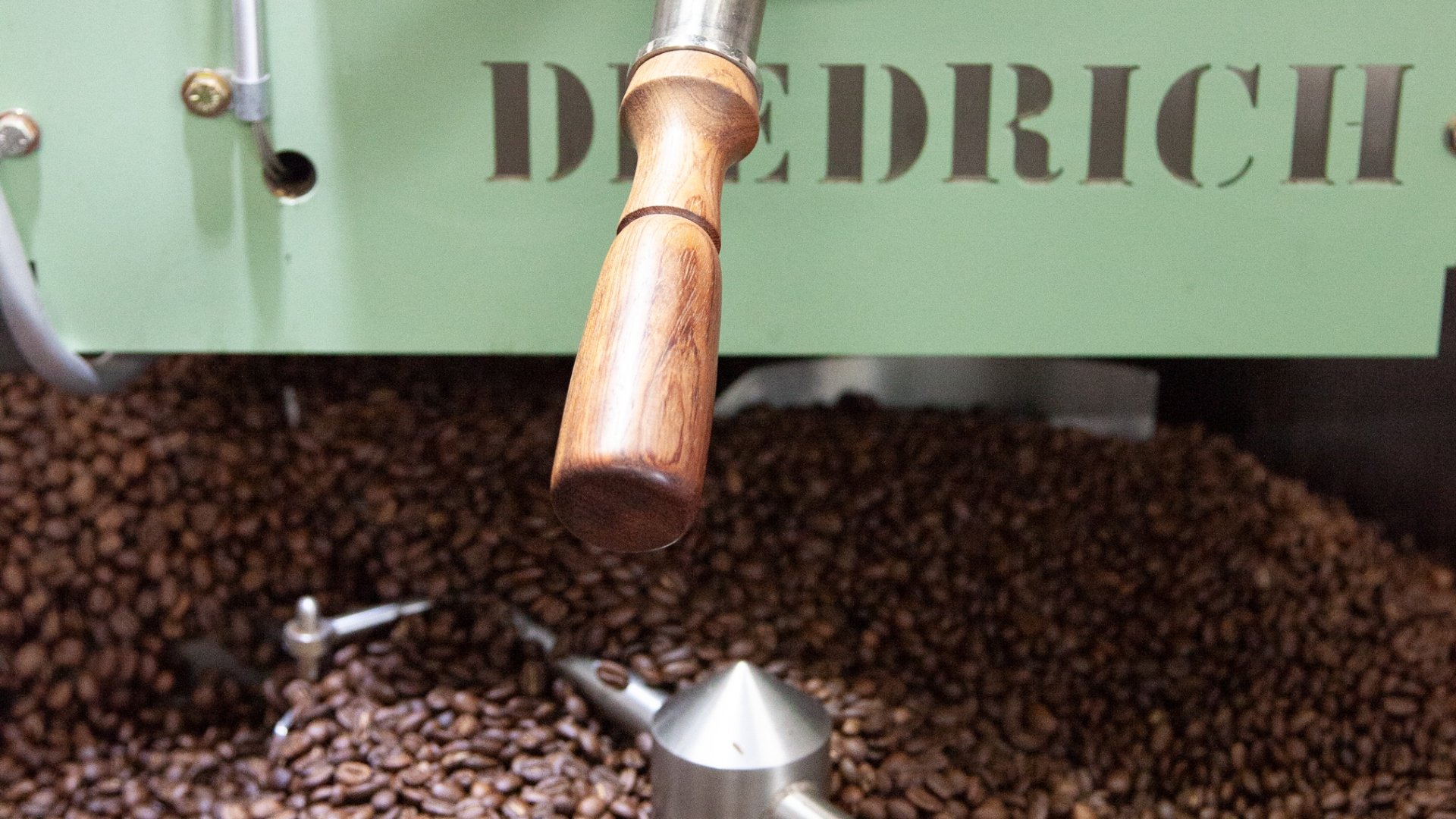Simple Roast Coffee
straightforward, sophisticated, and locally roasted
The Inns of Aurora is partnering with Simple Roast Coffee in Auburn, NY to provide guests with an exceptional brand of local coffee—lovingly and unpretentiously roasted just up the road from Aurora. We checked in with owner Matt Peirson to talk about how he taught himself to roast coffee, the challenges of parenting twins while running a business, and the virtues of a delicious, fuss-free cup of coffee.
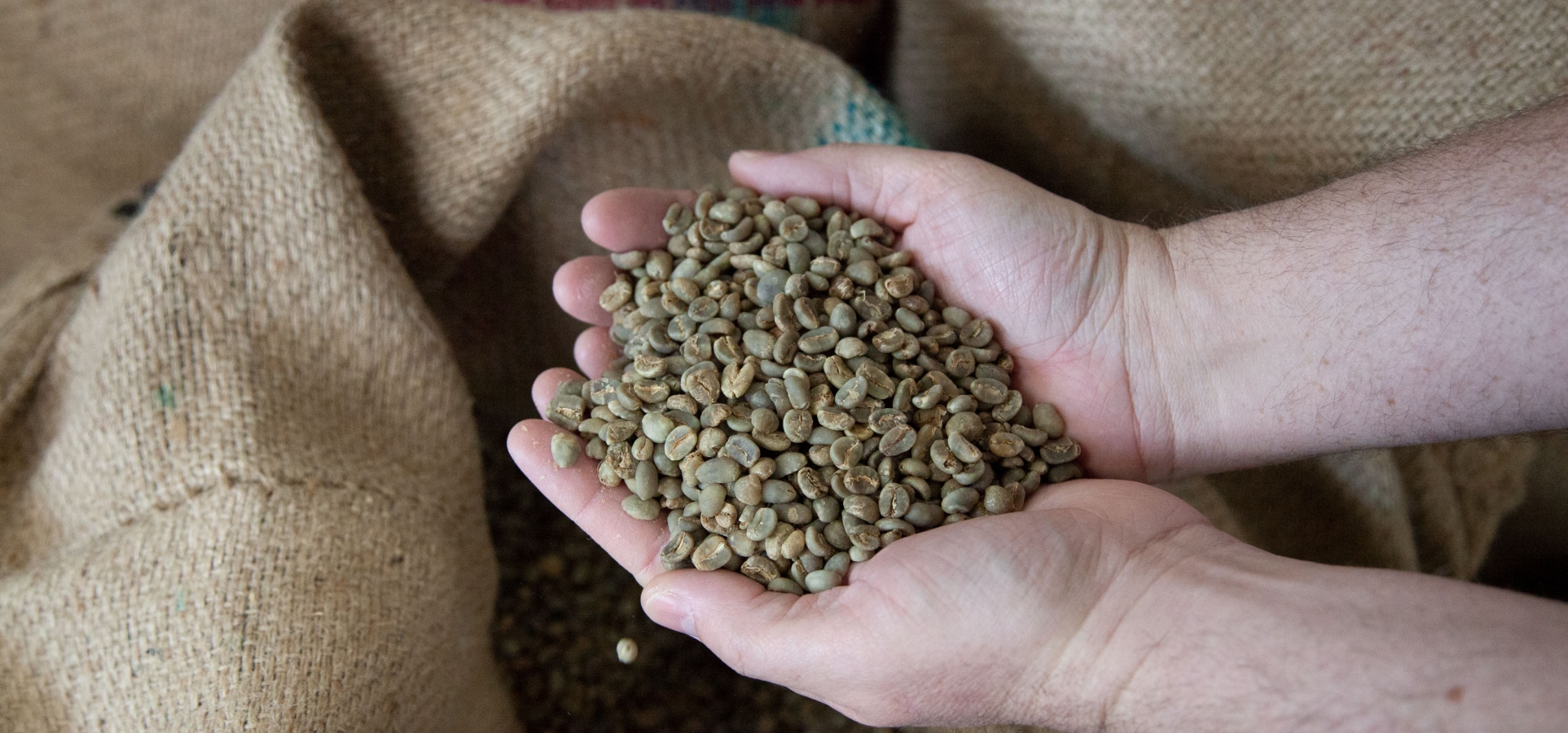
Matt Peirson of Simple Roast Coffee is—like the old Lynyrd Skynyrd song says—a simple kind of man.
“I told one of my friends back in college, ‘Yeah, I just want to own a coffeeshop, have a wife and a couple of kids, be able to enjoy my weekends,’” says Matt.
About a decade later, he’s done exactly that: married, with two kids (twins, in fact), and running one of Auburn’s most popular coffee shops, with two drive-through locations and a new roasting facility. By all accounts, he’s enjoying his weekends, even though the coffee business has proved to be more challenging than he originally envisioned.
“Back in college, I was more into the idea of what I thought owning a cafe would be like. You know, you’re the owner, come in while everybody’s working, read the paper and sit in the corner, that kind of image. That’s not what it’s like,” he says, laughing. “But I had romanticized it in my mind in college, and that kinda got the ball rolling. I’m still thrilled with what it is now. I love my job. There are days that are crazy and super frustrating and difficult, and it’s absolutely the hardest thing I’ve ever done in my life—but it’s also incredibly rewarding. It feels good to be part of a team and get to interact with [the baristas] every day and have customers who love what we’re doing so much.”
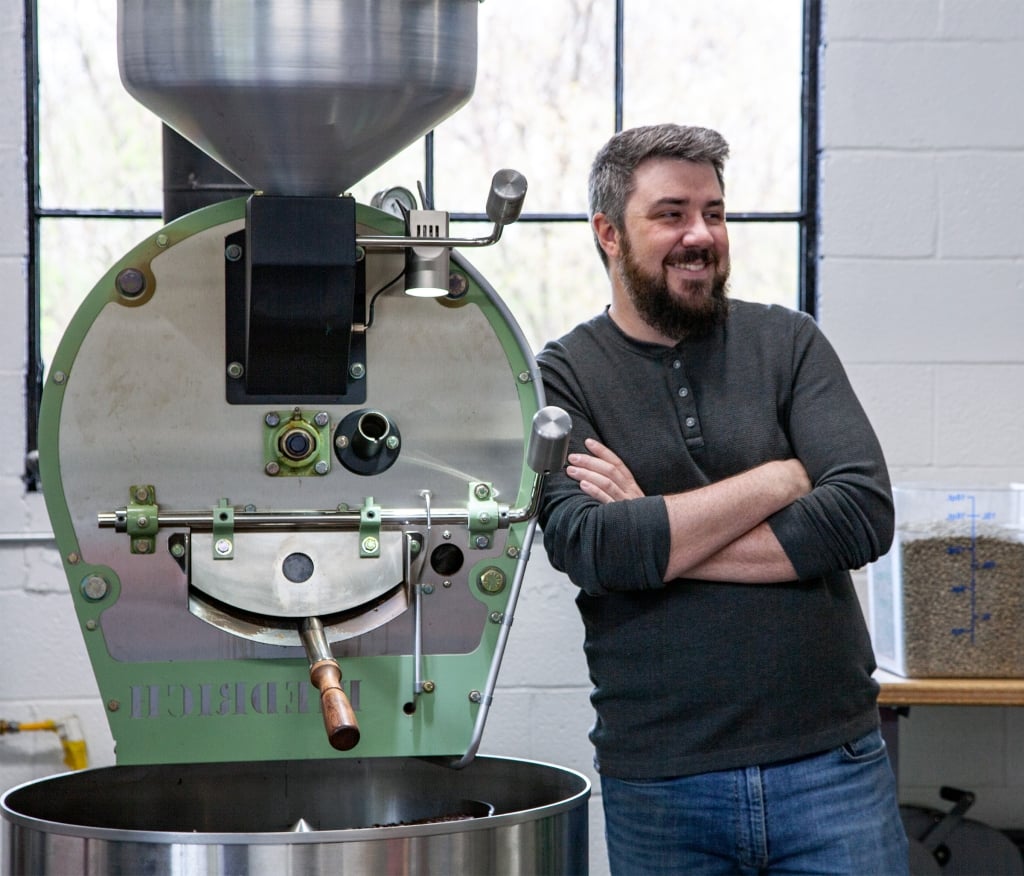
Matt started out roasting coffee as a hobby in 2011. He’s a tinkerer by nature—interested in learning a process, getting the right tools, fine-tuning everything, and producing something interesting. Before roasting coffee, he’d tried his hand at home brewing beer but decided that it wasn’t for him. “I was brewing beer originally. That was a lot of work, and then halfway through you find out it’s contaminated and it’s ruined… you wait four weeks and then there’s no payoff,” he says.
Then he discovered coffee roasting.
“I got a cheap coffee roaster from my parents for my birthday in 2011, and just got hooked on it. All these different coffees and all the different ways to roast the beans just pulled me in,” he says. “I started selling coffee at the farmers’ market around 2013 just as a way to afford more beans so that I could keep experimenting… it just organically grew from there.”
Matt learned how to roast coffee the hard way. He started out watching instructional videos online, reading about other people’s experiences and techniques, and getting support from online communities dedicated to the craft. The roasting machine that he used in the beginning lacked almost all of the automated functions that a professional set-up would have. Matt had to teach himself how to roast by intuition.
“It was just trial and error,” says Matt. “I had a small roaster, so I could only do twelve ounces at a time, and if I screwed up a roast I was only out three or four dollars. The machine I learned on had no temperature gauge or computer hooked up to it, so it was truly just ‘How does it smell while it’s roasting, how does it look, what does it taste like when it’s done?’ It kinda forces you to learn the important things, instead of relying on a machine to do it, which I think helped tremendously in the beginning.”
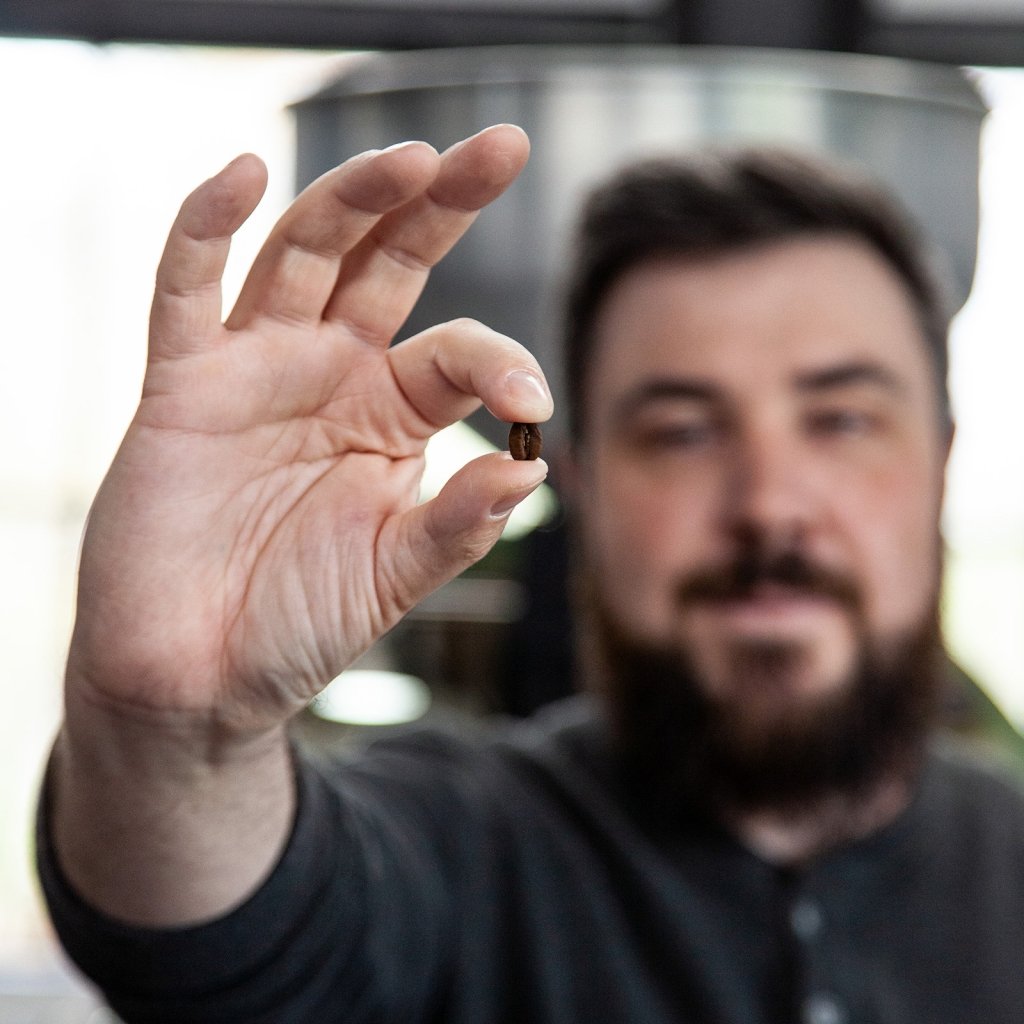
Once the consistency of his coffee improved, Matt began to gradually scale up his roasting operation, with whatever spare time he could find, while still working at his full-time job.
“At the time, I was working at an insurance company,” says Matt. “I went to college for business entrepreneurship. I always had this idea that I wasn’t going to work in an office. Ironically, I worked in an office for six and a half years right out of college. But I wrote my business plan [for the coffee shop] at work on my breaks; I was getting permission to leave work on Wednesdays to go to the Fayetteville Farmers’ Market to try to drum up my side-hustle.”
Sourcing beans to roast at that scale was one of Matt’s first big hurdles. Getting a few pounds of beans to roast at home was relatively easy. As he graduated from roasting as a hobby to selling at the farmers’ market—starting to develop a loyal customer base who expected consistency—he needed larger quantities than what he could find on the Internet.
“As a hobby roaster, you can get what are called ‘broken bags’ online… They sell bags that are anywhere from one pound to twenty pounds for a specific bean,” he says. “But when you get bags of coffee from Costa Rica, for example, they come in bags of one hundred and fifty pounds—those big burlap bags. When you’re a hobby roaster, obviously you don’t want to invest the money for a hundred and fifty-pound bag, so you start small.”
The next step was finding a commercial broker to source one of those big bags. That first bag was a big leap for somebody still working in insurance and roasting on their own: bigger than a typical hobby roaster’s order, but not quite big enough to open a commercial account with a serious supplier.
“I called around to the brokers in the area and said ‘Hey, I’m a hobby roaster, but I need to buy a hundred and fifty-pound bag,’” says Matt. “And I found one guy who agreed to sell me a bag if I drove down to New Jersey to the warehouse. That guy’s name is Joe. And since that day, he’s the only person I buy coffee from, because he’s the only one who would sell it to me when I needed some help. And now we buy five hundred bags a year.”
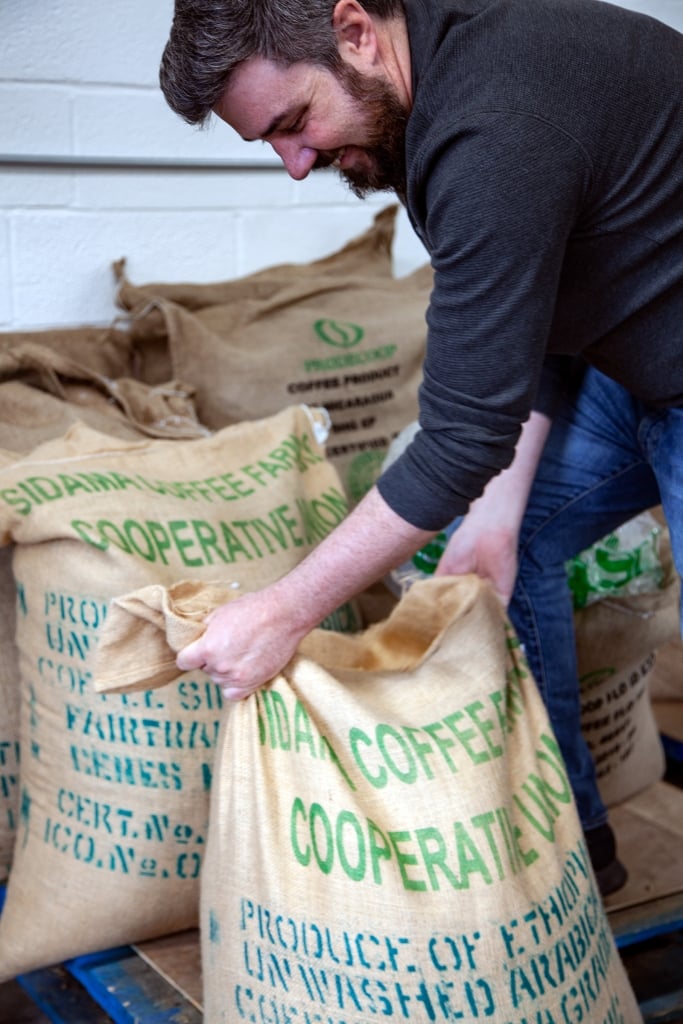
Matt was up and running. Business at the farmers’ market was good. The investment in a larger supply of beans paid off, allowing him to sell more and build his fan base. But he still didn’t have his own place.
Then, in 2016, he got a call from a friend.
“Our friends at CoffeeMania knew the people that owned the [drive-through kiosk] in Auburn. He knew I had been looking for a place, and when it came up for sale, he called me and said ‘You gotta buy this building, you gotta quit your job and open a drive-through,’” says Matt, laughing. “And I said, okay, let me check with my wife—who was my girlfriend, at the time—and she was supportive of it. So I put the sale offer in on a Friday, quit my job that Monday, and in three months we had it open and running.”
The little drive-through kiosk, situated in a parking lot on the outskirts of Auburn—”the hut,” as Matt calls it—wasn’t the romantic cafe that he had dreamed of in college. But it was his place. And after a slow start, his easy-going approach to coffee was embraced by the people of Auburn.
“Auburn was apparently just primed and ready for this… nobody else was doing an espresso bar,” says Matt. “We opened up, and it took a little bit of time. The first eight months there was no work. It was just me and my two employees—who are my managers now—going home early, watching TV on shift, which is funny to think about now. [Laughs.] But all of a sudden, it was like lightning struck, and it all just took off… word of mouth paid off.”
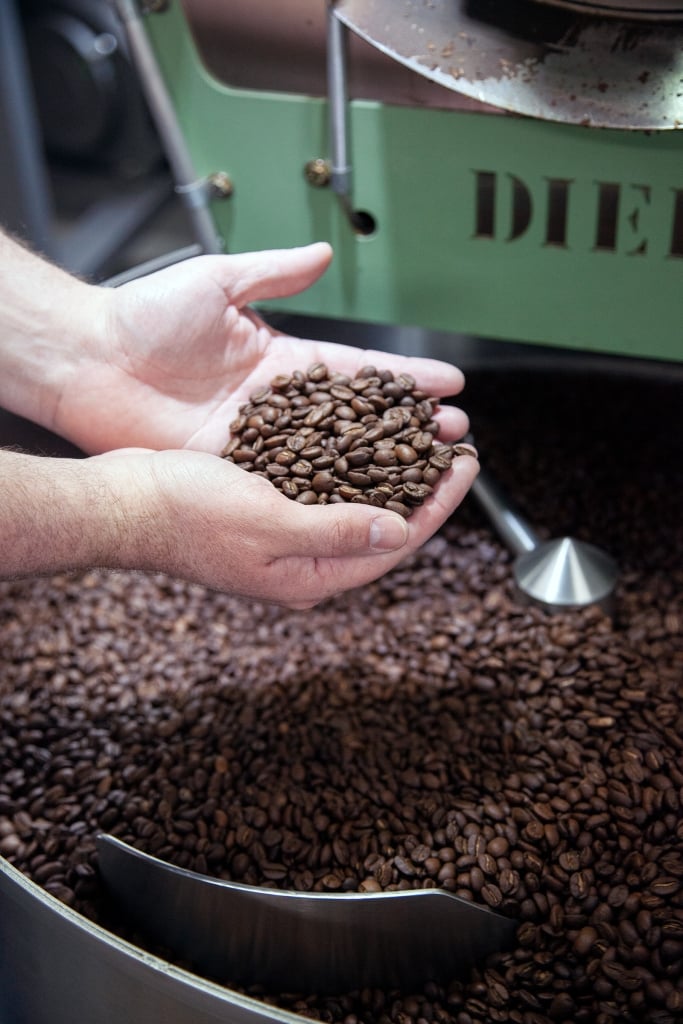
Business was so good that Matt decided to open a second location. Meanwhile, another part of his college dream came to fruition: twins, born in December 2018, a few months before the second location would open. Matt and his wife were running one business, opening a second, and parenting two infants, all at the same time.
“Once you open, the baristas take over and the managers take over, but everything prior to that is coordinating contractors and construction, preparing and ordering,” recalls Matt. “My poor wife and I had three-month-old twins at home and we’re trying to figure out where we’re getting PortaFilters from. Honestly, to think back on it, it’s like it happened to somebody else. [Laughs.] I don’t know how I got through it, because it doesn’t seem like I could do that.”
Since then, the business has continued to thrive. Simple Roast’s original two-kilogram roaster has been replaced by a ten-kilogram roaster, capable of churning through eighteen pounds of beans per roast—a testament to the amount of coffee Simple Roast is selling, and a long way from the little one-pound batches that Matt first learned with. Even though his capabilities have expanded enormously, Simple Roast’s coffee is still guided by the laid-back, common-sense approach that Matt developed as a hobbyist with his very first roaster. And his fan base continues to grow dramatically—and enthusiastically.
“I love my coffee, and I’m proud of it… the amount that other people love what we’re doing is almost scary,” says Matt, laughing. “They’ll pull up to the drive-through and have a million of our stickers all over their dashboard of their car… I think people were receptive to it because I didn’t come in like ‘You have to try this, this is the best coffee in the area.’ We flicked the lights on and said ‘Hey, give it a shot, you might like it, we’re just super stoked that you’re here, that you decided to stop at this shed in a parking lot.’”
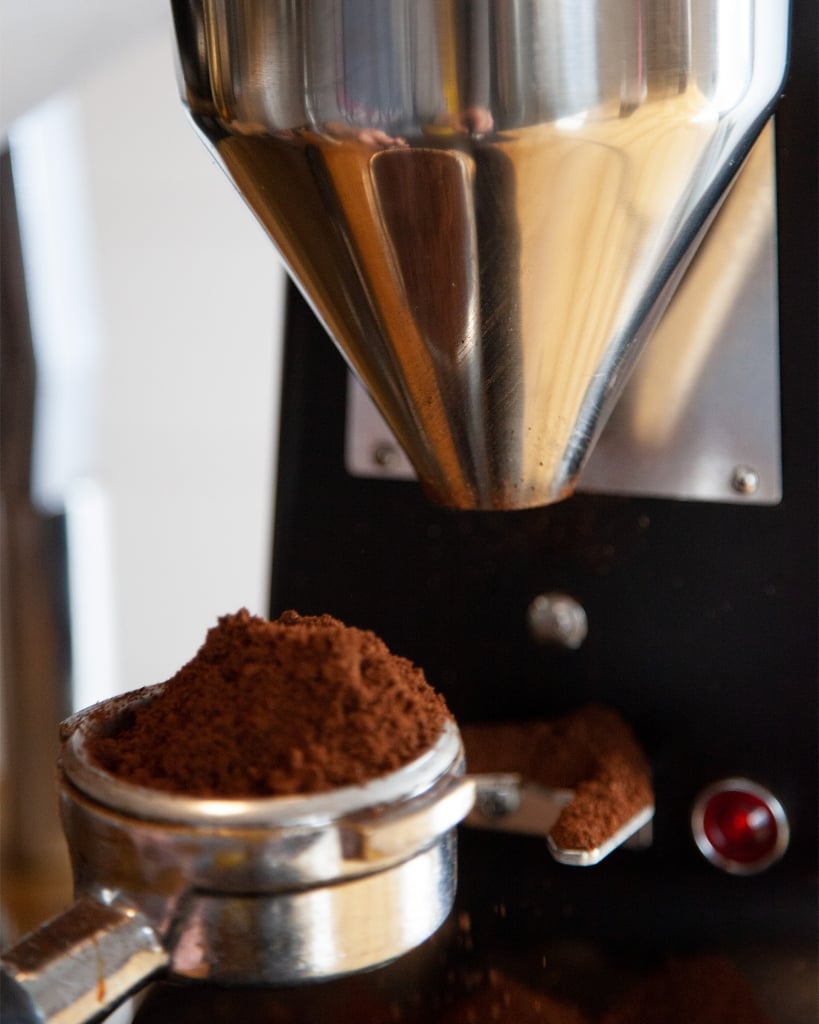
The scope of his ambitions for the business doesn’t go too far beyond what he has now. “I’ve apparently already fulfilled all my college dreams, and I’m content. And a third location might kill me,” says Matt.
And besides—growing bigger might mean compromising on the quality of his coffee.
“I have the capacity to roast more. The roaster only runs thirty hours a week, so there’s more room in there, and we can package and send out coffee all day,” says Matt. “But some of that ‘keep it simple’ ethos doesn’t work for wholesale. We don’t do any wholesale beans pre-ground. We only do paper bags with tin ties for all of our packaging, we don’t heat seal anything… once you start packaging things that way, it gives people permission to keep it on the shelves longer. One of my best and one of my first wholesale customers is Green Planet Grocery in Fairmount: they order every other week, they only order enough for two weeks on their shelf, and I come in and I stock it. It’s great… fresh coffee versus something that’s been sitting on the shelf is a huge difference all on its own.”
That commitment to quality is a big part of why Matt was excited to take on the Inns of Aurora as a wholesale customer. Something as simple as having coffee grinders on-site makes a big difference for Matt’s peace of mind when he chooses to work with a wholesale account. “As soon as [the Inns] told me they had their own grinders, I was like, ‘Okay, this’ll be great.’ Because that says so much to me… that means that you’ll be grinding it fresh and representing my product in a way that I can stand behind.”
Matt is confident that—combined with the careful preparation provided by the Inns—the difference in his coffee will be instantly recognizable to guests. “A coffee that’s been roasted a month and a half ago versus a coffee that’s been roasted three days ago will taste totally different. That’s the thing that they’ll probably notice right away, like, ‘Oh wow, this is really smooth, a different taste than what I’m used to.’ We also don’t do any blending. So we’ve got a Peruvian coffee right now, and with that, you’re just tasting coffee from Peru. If you’ve never had that before, it’s distinct from other Central or South American or African coffees. If somebody’s never had a Kenyan coffee that’s light roasted before… it’s a whole different thing from every other cup of coffee they’ve ever had.” This style of coffee—unpretentious, yet sophisticated—is right in line with the Inns’ dedication to approachable luxury: giving guests a taste of something well-made and exceptional on its own merits, distinctive to the Finger Lakes region.
For now, in addition to his partnership with the Inns of Aurora, Matt is happy with what he has: enjoying his weekends with his family; roasting great coffee; serving the people of Auburn; selling to wholesalers that will honor his commitment to quality. Keeping things simple.


